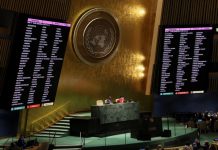
The Taliban leadership has hinted towards the possibility that Afghanistan will be led by a council that will govern under the authority of the Taliban’s top leader Mullah Hibatullah Akhundzada.
A senior Taliban member, Wahidullah Hashemi, told Reuters that a council might rule Afghanistan, and the council’s authority will be determined by the supreme Taliban leader Akhundzada.
“Discussions haven’t been conducted on what it will be like—perhaps we will establish a council. What you call a president, we will call ‘the head of ministers.’ We will have ministers, and all these ministers will be appointed by the head of the council,” said Hashemi.
“Amirul Momineen, whose name is Mawlavi Hibatullah Akhundzada, is our religious leader and also our political leader. But at the moment, he does not play the role of a president. He plays a stronger role. We will have a person there who will play the role of a deputy or a president,” said Hashemi.
The statement by Hashemi came on Thursday, August 19, which marks Afghanistan’s Independence Day. Celebrations were not as large as in previous years, before the Taliban takeover.
Earlier, Abdullah Abdullah, the head of the High Council of National Reconciliation, and former President Hamid Karzai met with Khalilurrahman Haqqani, the nephew of Sirajuddin Haqqani, the leader of the Haqqani network.
“We will keep our relations with the world, but all these ties will be determined in accordance to some principles and based on our national principles,” said Zabihullah Mujahid, a Taliban spokesman.
“We call on the Taliban to not try to keep power through military force,” said a resident in Kabul, Rohullah Ahmadzai.
“Our expectation from the international community and the UN Security Council is to concentrate on Afghanistan and to not allow the gains made by the Afghans be wasted,” said Kabul resident Mohammad Idris Wahidi.
Meanwhile, Afghans spoke of celebrating Independence Day.
“Our people have given a lot of sacrifices for this flag; we will also struggle for it,” said Shahla Bayat, a resident in Kabul.
This comes a day after hundreds of people in Khost, Nangarhar and other areas protested for Afghanistan’s national flag.









